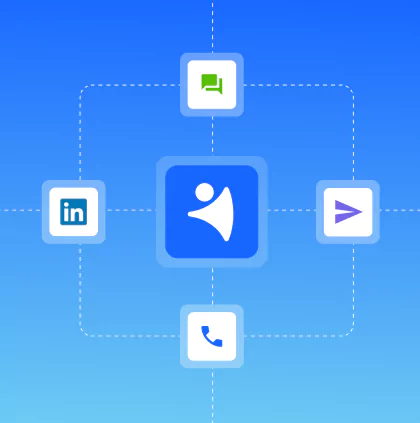Running a start-up business isn’t an easy task. Small businesses are always under attack. Insufficient funds, lack of resources, high entry barriers and lots of competition all pose a serious problem on the path to growth. Usually, at the early stages of establishing a company, small business owners are trying to deal with everything on their own. Unfortunately, Jacks of all trades are often masters of none.
Half of small businesses fail within five years.
Source: Bureau of Labor Statistics
But don’t be discouraged by the stats. While many difficulties creep up on small businesses, what some call a problem can be an excellent opportunity for growth. You just need to have a robust ‘Plan B’ and an equally infallible ‘Plan A’ - implement a reliable CRM solution to streamline a heap of complex yet mundane business processes.
Read more about why your small business really needs a CRM!
In this article, we will talk about the most common problems SMB faces and how a CRM solution can solve those. A nifty piece of software is sometimes all you need to grow your small business into something more stable and profitable.
Let’s get growing!
Problem: You've not got enough leads.
“Life would’ve been so much easier if I just had more people to sell to!”
It’s not rare to hear complaints like this from small business owners and salespeople. You might be the most skilled salesperson who can quickly sell sand in the Sahara Desert- but none of that matters if you don’t have someone to work your magic on.
Lead generation is one of the most common problems small businesses face. Without an established name and lots of satisfied customers that refer your products and services to their network, it’s likely that your lead generation process is slow and erratic.
Not only do you need to compile a database of contacts, but you also need to ensure the leads that enter your system are of high quality and eventually convert into paying customers. You need a plan for how and where you search for potential customers and how you manage their capture for subsequent nurturing.
How to find out where your sales funnel is stagnating with a CRM
How a CRM system can help...
There are several ways you can enhance lead generation opportunities with a CRM solution. Let’s look at the most effective methods.
- LinkedIn lead generation.
We often talk about the value of LinkedIn for prospecting. This social media platform is a goldmine for small businesses looking for leads. It’s designed for salespeople of all calibres to connect with potential customers. There are hundreds of millions of LinkedIn members from around the world, so regardless of the nature of your business - either a worldwide salesperson or local tradesperson - you can easily reach your target audience.
- Outbound email lead generation.
Another effective way to find leads for your small business is cold emailing. Using NetHunt CRM’s emailing functionality, you can easily facilitate both direct and personalised mass outreach. Find tips for effective cold emailing from experts in this article.
Just compose a cold email using the appropriate strategy, and shoot the outreach campaign to your prospects with the NetHunt’s bulk emailing feature. You always know how your email sales outreach performs. Our CRM offers an email tracking feature so you can always access the stats on your email campaigns - opens, clicks, responses and more at an arm’s length.
- Web form lead generation.
Web form lead generation is the most effective way to collect new contacts for your database. Web forms are a great way to capture leads from your website and automatically create CRM records enriched with data. With NetHunt CRM’s sales automation feature Workflows, you can easily create beautiful web forms, share them on your website and have the leads flowing right into the system.
Bonus points: this lead generation strategy eliminates manual errors as the system automatically captures all the data.
Find out how CRM helps in customer acquisition
Problem: Messy, decentralised data.
We’ve already established that there are lots of sources where your leads could be coming from. This can pose both an opportunity and a threat for your small business. While it’s good news you’re getting more sales opportunities with more people interested in your product, it can also create a mess in your database.
Imagine...
You have a beautiful website with a lead generation web form on the landing page, a LinkedIn page to increase your visibility online, and a hotline for people to reach out to you by phone. You’re also running several email outreach campaigns to maximise lead generation efforts. For each of these channels, you have a separate database that you need to manage and update.
At first, it doesn’t seem like too bad of a problem. It doesn’t seem like a problem at all. While you’re still small, you can easily remember who’s already entered your sales pipeline and who hasn’t. But as your small business grows, you quickly realise that some leads can use different communication channels, and your database is filled with duplicates or - what’s worse - missing some crucial details. It’s messy and inefficient.
How a CRM system can help…
A multi-channel CRM system integrated with various platforms is a great way to get rid of this problem and clean up your database. It collects data from many sources in a single place, so every interaction you have with your leads across different channels is centralised under one big umbrella. Moreover, whenever you create a new record, there is a set of required fields so you can be sure you don’t miss any important details.
For instance, NetHunt CRM gives its users a chance to collect leads in one click from emails, LinkedIn, web forms and chats on the website (Intercom and Facebook Messenger).
Problem: Discordant workflows.
When you’re working on your own, you have a specific set of steps you take when dealing with leads and customers. However, when you have a team, it becomes difficult to ensure workflows work.
Without standardising the workflows of various tasks and assignments, you risk creating confusion within your team and a mess in your data. Unless there’s a clear understanding of what each team member needs to do, how they should proceed with specific tasks, and enter detailed data into the system, the chances of missed details and decreased productivity skyrocket.
How a CRM system can help…
With a CRM system, you can set up the same workflows for every incoming lead so that all of them go through the same customer journey, from filling out the form on your website to receiving the same emails. Managers will have the same set of tasks for every deal, not missing a single step along the way.
NetHunt CRM users benefit from the following capabilities of sales automation...
- Set up a certain amount of follow-ups that your team decides to be the most effective.
- Have leads automatically assigned for a responsible manager, so there are no missed opportunities.
- Set up action-triggered email sequences so your leads don't wait for ages to get the first response after registration.
- Set up triggers to move leads to the next stage of the sales pipeline.
When employees have a set sequence of actions to take and know what to expect from each other, their work will go much smoother. As a result, a shorter sales cycle and more closed deals - precisely what you need to enable your small business to grow!
Problem: Sales reps contacting the same leads.
Even when there’s a decent level of standardisation of business workflows, it could still be that your sales reps are performing the right actions on the wrong leads. There are two significant problems associated with your company reaching out to the same leads more than once.
- It’s unproductive. Every time your sales reps reach out to someone who’s already been contacted, they’re wasting their time and, therefore, miss an opportunity to convert more leads.
- It’s damaging to your reputation. Personalisation of communication lays the foundation of successful sales. If you contact the same person twice, they might feel like they don’t matter and be less likely to work with you in the future. You don’t want to come across as an inattentive seller, especially when you’re a small business that’s still establishing its name in the market.
- It can sew discord within your team. While this one is rare but it still is a factor to consider. If one of your sales reps is consistently ‘stealing’ a colleague’s leads, the latter can become disgruntled.
How a CRM system can help…
NetHunt’s duplicate prevention feature automatically scrubs your customer base by removing, merging or warning you about potential duplicates whenever you add new contacts to the system. Moreover, to eradicate sales reps working with leads they aren’t assigned to, you can also take advantage of the custom view feature.
In fact, not taking advantage of it would mean you’re criminally underusing your CRM solution.
In NetHunt CRM, every sales rep can create custom views to add the companies assigned to them and work with those leads. Some other custom views that salespeople can create to maximise the efficiency of their work include...
- Leads that haven't been contacted for X amount of days.
- Leads that don't have any activity for X amount of days.
- Deals expected to close this month/this week.
- Territory filter: all the deals in a certain country/city/area.
Watch this video to find out how to create custom views in NetHunt CRM.
Problem: Misaligned Sales and Marketing Activities.
Although the sales and marketing departments are working towards achieving the same goal of generating the most sales for the business, they’re using different methods. It’s a standard business practice, but it can often lead to a small business failure if those activities contradict each other. With two different systems to track their progress, that don’t overlap in any shape or form, can hinder business growth.
A marketing team needs to define the perfect buyer profiles to target; develop sales enablements and other marketing assets to attract and nurture leads more effectively, and pass on their reports to the sales team. The sales team needs to report on the quality of the leads entering the sales pipeline, the sources that generate the most leads, and the rate at which they’re moving down the pipeline.
That way, marketing managers know which of their efforts are sufficient and require more attention, while sales reps know exactly how to nudge the leads towards making a purchasing decision. It’s a synergy. In any other scenario, it’s a catastrophe. When either of the teams isn’t getting relevant, up-to-date and timely information about leads, conversions aren’t possible.
How a CRM system can help…
With a CRM solution in place, your sales and marketing teams work collaboratively as they have access to the same customer data, updated in real-time. It becomes easy for them to track acquisition channels and conversions from every channel and source. This way, they can give up some of the marketing channels that don’t perform as expected and scale the ones that work well.
Problem: Customer Churn.
It costs five times more to acquire a new customer than to retain an already existing one. As a small business, you can’t afford to lose all that money by not paying enough attention to minimising customer churn. Many strategies can help you increase your LTV and improve your customer retention rate. All of them have in common that they require a CRM solution to ensure the best results.
Furtner read: Discover top reasons why customers churn.
How a CRM system can help…
To keep your customers engaged and to encourage them to continue buying from your business, you need to build a robust relationship with them and have an eye for details.
A CRM system helps you stay on top of your customer data and know when it’s the best time to reach out to customers, either to consolidate a relationship or to save one that’s hanging by a thread. Using a CRM solution, you can set up notifications for clients who haven't been active for a certain amount of days, monitor those leads, and either contact them personally or set up automated emails.
Similarly, you can set up reminders for customers and leads you haven’t heard from in a while. It’s up to you to decide on the number of days of worrying silence and then to set up tasks to send them follow-ups.
Problem: Missed upselling and cross-selling opportunities.
The sales process doesn’t stop once the deal is won. Even after your customer made a purchase, you can still expect them to make a return purchase. You should try to up-sell or cross-sell a product.
The latter option is a tricky one. You don’t want to come across as pushy. You also don’t want your customer to think you treat them as a cash bag by slipping them expensive, irrelevant offers. Sending generic offers to existing clients won't end up anything good. Being inattentive to your customers and their needs can rob you of a chance to generate more sales and ruin the relationship you’ve managed to build with them so far.
If you’re spreading the word about your ‘one-of-a-kind, limited-time-only’ using email marketing, you’re probably ending up in the spam folder. Not only is that a big loser moment for you, but it can also lower your email sender’s score making the benefits of successful email marketing unavailable to you. Then, it’s finita la Commedia for your small business.
How a CRM system can help…
If you want to increase your sales through the means of up-selling or cross-selling to existing customers, you need to offer them something that would be of interest to them; something they’d find useful. To do that, you must know what their needs are in the first place.
CRM helps to create special tags for clients with features they need or any special requests. Once you have it implemented you can send them personalised offers that increase the chance of conversion and upsell.
Problem: Inaccurate sales planning.
To manage your finances effectively, you need to make sure that you adequately assess your current situation and make accurate projections regarding your expenses and revenue. If not, you risk going bankrupt.
Unless you have a clear understanding of your financial situation and where it’s headed, you can’t effectively develop your business. Project revenue too high and you’ll end up with nothing to cover your expenses. At the same time, underestimating your sales isn’t going to do you any good either.
It’s better to invest in developing your product and growing your business rather than sitting on a pile of illiquid cash.
How a CRM system can help…
The majority of good CRM solutions offer sales forecasting functionality that allows businesses to see the forecasted revenue for their pull of deals that are about to close. Moreover, it also calculates the money they have from existing clients. That way, you can make financial plans and know what’s available to be re-invested in marketing or product development.
Problem: Low-quality communication with customers.
These days, even product-oriented companies are selling services, too: customer service. When the competition is so high, you need to maximise your customers’ customer satisfaction and ensure you’re providing the most outstanding customer experience.
Otherwise, customers will quickly choose your competitors over you.
With the rapid development of technology and the amount of data shared every second, customers don’t want to wait to receive guidance. They want efficient communication and helpful replies. Unfortunately, this is difficult to arrange if you’re storing all your customer data across dozens and dozens of platforms.
If you fail to ensure continuity of communication and forget about the details of your past interactions, you’ll quickly lose customers trust and respect.
How a CRM system can help…
With CRM, you have all the data aggregated. It provides you with a full and complete overview of every instance of communication you’ve ever had with your lead or customer. You see all the notes, their initial problems, and the results they wanted to achieve with your solution. Knowing that you can increase the conversion rate and their recurring payments by making sure they meet their initial needs.
Small business goes hand in hand with CRM software. But only if it’s a good one, of course. If you want your CRM solution to be a useful investment that helps you solve problems, you need to make sure you opt for the most suitable tool. There are lots of options available on the market, so before you commit to one, make sure you know what you’re looking for.
Do small businesses really need CRM?
Or you could choose us. NetHunt CRM is your small business’s best friend! The best thing is? We won’t leave... even after you grow.




















 product experts — let's find the best setup for your team
product experts — let's find the best setup for your team